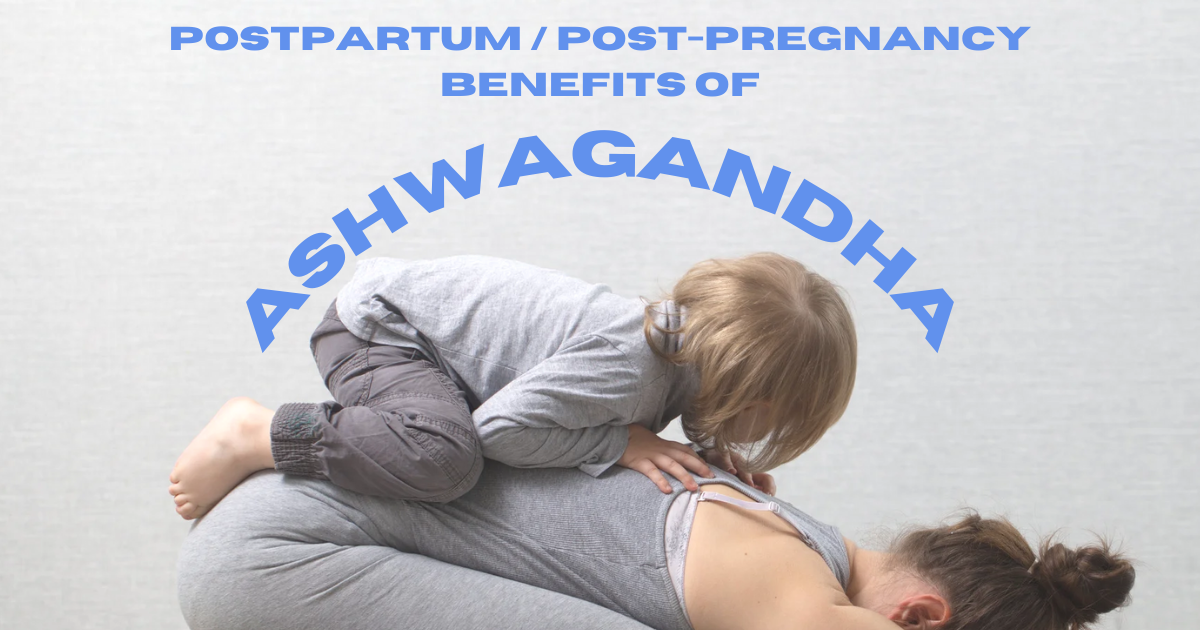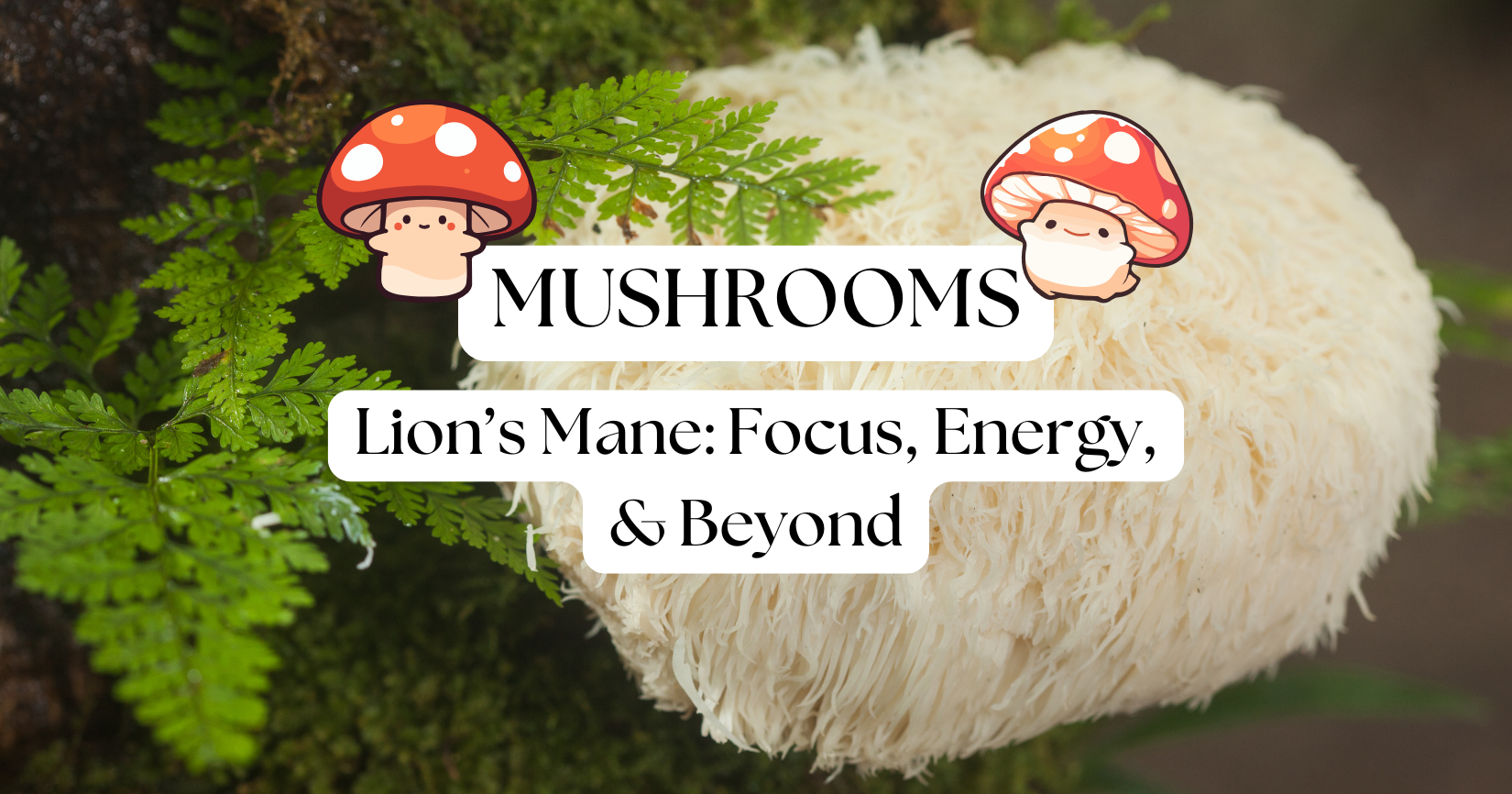Ashwagandha para el equilibrio hormonal: un aliado natural para el bienestar posparto
El posparto es un momento transformador tanto para la mente como para el cuerpo. Como madre primeriza, probablemente estés experimentando una vorágine de cambios, desde la alegría de conectar con tu bebé hasta los numerosos cambios físicos y emocionales que se producen tras el parto. Si bien estos cambios son naturales, a veces pueden resultar abrumadores, especialmente en lo que respecta al equilibrio hormonal.
Presentamos la ashwagandha , un potente adaptógeno utilizado durante siglos en la medicina ayurvédica. Conocida por su capacidad para aliviar el estrés, aumentar la energía y el bienestar general, la ashwagandha puede ser un valioso aliado para las mujeres que enfrentan los síntomas posparto.
Desequilibrio hormonal después del embarazo: qué esperar
Durante el embarazo, hormonas como el estrógeno , la progesterona y la oxitocina aumentan considerablemente para apoyar las diversas funciones del cuerpo, desde la crianza del bebé hasta la preparación para la lactancia. Tras el parto, los niveles hormonales fluctúan rápidamente, lo que puede provocar síntomas como:
- Cambios de humor o depresión posparto : La disminución de estrógeno puede contribuir al bajo estado de ánimo, la ansiedad e incluso la depresión posparto.
- Fatiga : Las nuevas mamás a menudo enfrentan agotamiento no sólo por las noches de insomnio sino también por los bajos niveles hormonales.
- Pérdida de cabello : Muchas mujeres notan una pérdida significativa de cabello después del embarazo debido a una caída repentina del estrógeno.
- Retención de peso : Los desequilibrios hormonales pueden dificultar la pérdida de peso durante el embarazo, especialmente si los niveles de cortisol (la hormona del estrés) son altos.
- Períodos irregulares : el ciclo menstrual de una mujer puede tardar meses en regularse después del parto, en particular durante la lactancia.
Cómo la ashwagandha favorece el equilibrio hormonal después del embarazo
La ashwagandha es un adaptógeno, lo que significa que ayuda al cuerpo a adaptarse al estrés y a mantener la homeostasis. Así es como esta hierba natural puede ayudarte durante el posparto:
1. Equilibrar los niveles de cortisol
La vida después del embarazo suele ser estresante, con nuevas rutinas y responsabilidades que se acumulan. Los niveles altos de cortisol (la principal hormona del estrés del cuerpo) pueden exacerbar la ansiedad, la fatiga y la retención de peso. Estudios sugieren que la ashwagandha puede ayudar a reducir y estabilizar los niveles de cortisol, facilitando el manejo del estrés y previniendo el agotamiento. De hecho, muchas mujeres descubren que la ashwagandha les ayuda a promover una sensación de calma y equilibrio en su vida diaria después del parto.
2. Apoyo a la función tiroidea
La tiroides desempeña un papel fundamental en la regulación hormonal y el metabolismo, y los problemas de tiroides posparto son comunes. Se ha demostrado que la ashwagandha favorece la función tiroidea saludable al promover la producción de hormonas tiroideas. Si te sientes inusualmente fatigado o tienes problemas de retención de peso, la ashwagandha puede ayudarte a normalizar la actividad tiroidea, devolviéndote la energía que tanto necesitas.
3. Mejorar el estado de ánimo y combatir la depresión posparto
El bajo estado de ánimo o la depresión posparto suelen estar relacionados con niveles bajos de estrógeno y progesterona después del parto. Las propiedades antiestrés de la ashwagandha también pueden contribuir al equilibrio anímico. Como adaptógeno, ayuda a regular la respuesta del cuerpo al estrés, lo que puede aliviar la ansiedad y la depresión. Algunos estudios incluso sugieren que la ashwagandha puede ayudar a equilibrar neurotransmisores como la serotonina y la dopamina, mejorando así el bienestar emocional.
4. Aumentar la energía y reducir la fatiga
Cuidar a un recién nacido es agotador, pero cuando los desequilibrios hormonales intensifican el cansancio, puede resultar imposible superar el día. La ashwagandha es conocida por promover una energía sostenible al mejorar la resiliencia del cuerpo al estrés y favorecer la función suprarrenal. A diferencia de la cafeína u otros estimulantes, que proporcionan un pico de energía a corto plazo, la ashwagandha ofrece un impulso tranquilo y constante, que ayuda a afrontar la vida posparto sin desplomarse.
5. Restaurar el crecimiento del cabello
La caída del cabello después del embarazo es una preocupación común a medida que disminuyen los niveles de estrógeno. Al favorecer el equilibrio hormonal y reducir el estrés, la ashwagandha puede ayudar a minimizar la caída del cabello y promover su crecimiento saludable. Sus propiedades antioxidantes también ayudan a combatir el estrés oxidativo, que puede afectar los folículos pilosos.
Cómo usar ashwagandha de forma segura después del embarazo
Antes de añadir cualquier suplemento nuevo a tu rutina, especialmente durante el posparto, es fundamental consultar con tu profesional de la salud. Si bien la ashwagandha generalmente se considera segura, las necesidades corporales y de salud de cada mujer son diferentes, especialmente si estás amamantando o tomando otros medicamentos.
La ashwagandha está disponible en diversas presentaciones, como cápsulas, polvos y tinturas . Busca productos orgánicos de alta calidad para asegurarte de obtener la forma más pura de la hierba. Comienza con una dosis baja y auméntala gradualmente según sea necesario, según la respuesta de tu cuerpo.
Reflexiones finales: Un enfoque holístico para el bienestar posparto
Si bien la ashwagandha puede ser un apoyo increíble para el equilibrio hormonal y el bienestar general, su eficacia es mayor cuando se combina con otras prácticas saludables. Asegúrate de llevar una dieta rica en nutrientes, dormir lo suficiente (¡tanto como puedas!), mantenerte hidratado y buscar el apoyo de tus seres queridos y profesionales de la salud.
La experiencia posterior al embarazo es única para cada madre, pero al adoptar soluciones naturales como la ashwagandha, puedes tomar medidas suaves y significativas para restablecer tu equilibrio, energía y bienestar.
Pruebe hoy nuestras cápsulas de Ashwagandha orgánicas, sin gluten, vegetarianas, sin lactosa, 100% naturales, sin alérgenos y veganas.
Referencias:
- Chandrasekhar, K., Kapoor, J. y Anishetty, S. (2012). Estudio prospectivo, aleatorizado, doble ciego y controlado con placebo sobre la seguridad y eficacia de un extracto de raíz de ashwagandha de espectro completo y alta concentración para reducir el estrés y la ansiedad en adultos. Indian Journal of Psychological Medicine , 34( 3 ) , 255–262 . https://doi.org/10.4103/0253-7176.106022
- Lopresti, AL, Smith, SJ y Drummond, PD (2019). El efecto del extracto de ashwagandha (Withania somnifera) en biomarcadores de estrés y envejecimiento. Journal of Clinical Medicine , 8( 11 ) , 1748. https://doi.org/10.3390/jcm8111748
- Sharma, AK, Basu, I. y Singh, S. (2018). Eficacia y seguridad del extracto de raíz de ashwagandha en pacientes con hipotiroidismo subclínico: Un ensayo doble ciego, aleatorizado y controlado con placebo. Revista de Medicina Alternativa y Complementaria , 24( 3 ) , 243-248 . https://doi.org/10.1089/acm.2017.0183
- Bhattacharya, SK, Muruganandam, AV (2003). Actividad adaptogénica de Withania somnifera: Un estudio experimental con un modelo de estrés crónico en ratas. Farmacología, Bioquímica y Comportamiento , 75 ( 3 ) , 547-555 . https://doi.org/10.1016/S0091-3057(03)00104-8
- Andrade, C., Aswath, A., Chaturvedi, SK, Srinivasa, M. y Raguram, R. (2000). Evaluación doble ciego, controlada con placebo, de la eficacia ansiolítica de un extracto etanólico de Withania somnifera. Indian Journal of Psychiatry , 42 ( 3 ) , 295-301 . https://www.ncbi.nlm.nih.gov/pmc/articles/PMC2968393/
- Auddy, B., Hazra, J., Mitra, A., Abedon, B. y Ghosal, S. (2008). Un extracto estandarizado de Withania somnifera reduce significativamente los parámetros relacionados con el estrés en humanos con estrés crónico: Un estudio doble ciego, aleatorizado y controlado con placebo. Revista de la Asociación Americana de Nutracéuticos , 11(1), 50-56.
- Bhattacharya, A., Ghosal, S., Bhattacharya, SK (2001). Actividad antioxidante de los glicowithanólidos de Withania somnifera: Un estudio experimental del daño oxidativo inducido por estrés en roedores. Phytotherapy Research , 15( 6 ) , 544-548 . https://doi.org/10.1002/ptr.1029






